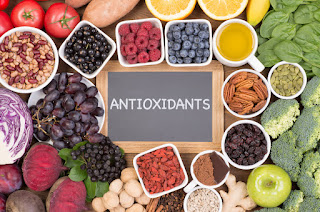Antioxidants
Antioxidants are compounds that inhibit oxidation and the actions of free radicals on your cells. Free ridicais are waste substances produced by cells as the body processes food and reacts to the environment. If the body cannot process and remove free radicals efficiently, then it causes an oxidative stress
Oxidative stress:- is an imbalance between free radicals and antioxidants in your body
Oxidative stress:- is an imbalance between free radicals and antioxidants in your body The oxidative stress leads to chain reactions that may damage the cells of organisms,
Factors that increase the production of free radicals in the body can be internal, such as inflammation, or external, for example, pollution, exposure to LIV rays, sedentary lifestyle, psychological stress, infections and smoking.
Oxidative stress has been linked to heart disease, cancer, arthritis, stroke, respiratory diseases, autoimmune diseases, immune deficiency, ADHD-attention deficit hyperactivity disorder, acceleration of the ageing process, emphysema, Parkinson's disease, myocardial infarction, and other inflammatory or ischemic conditions
Elite sports engagement also stimulates oxulative stress. Consumption of antioxidants is recommended as a part of training regime.
Role of Antioxidants
Antioxidants prevents the cell damage by neutralising the effect of free radicals. There are thought to be hundreds and possibly thousands of substances that can act as antioxidants. The external sources of antioxidants are
Vitamin A
The antioxidant activity of vitamin A and carotenoids is conferred by the hydrophobic cham of polyene units that can quench singlet oxygen, neutralize thiyl radicals and combine with and stabilize peroxyl radicals. Because of their structures, vitamin A and carotenoids can autoxidize when 02 tension increases, and thus are most effective antioxidants at low oxygen tensions.
Dietary sources of vitamin A include Dairy produce, eggs, and liver
Beta carotene the precursor to vitamin A. Beta-carotene plays a role in healthy vision, immunity, and bone health. This antioxidant is present in brightly coloured fruits and vegetables, such as carrots, peas, pumpkin, and mangoes. It is also found in dark leafy greens such as spinách, collard greens and kale.
Vitamin E
Vitamin E is called the antioxidant vitamin. This vitamin is found in eight various chemical forms in food, but alpha-tocopherol is the only form that meets human vitamin f needs. It protects membranes from oxidation by reacting with lipid radicals produced in the lipid peroxidation chain reaction. This prevents the propagation reaction from continuing
Sources of vitamin include - vegetable oils (such as wheatgerm oil), sunflower oil, avocados, uuts, seeds and whole grains
Vitamin C
Vitamin C is also known as ascorbic acid. This nutrient is naturally occurring in many plient-based food Ascorbic acid acts as a redox catalyst which can reduce, and thereby neutralize, reactive oxygen species auch as hydrogen peroxide. Morcovet, it revives other antioxidants attacked by free radicals such as vitamin F
Research suggests vitamin C may help protect against various diseases, including certain types of cancers, and heart disease
Sources of Vitamin C are oranges,blackcurrants, kiwifruit, mangoes, broccoli, spinach, capsicum and strawberries
Selenium
Selenium is an essential trace element that fights oxidative stress and helps defend your body from chromic conditions, such as heart disease and cancer.
Selenium can be found in seafood, offal, lean meat and whole grains, rice, corn, wheat, and other whole grais, as well as nuts, eggs, cheese, and legume.
Copper
This mineral is both a pro-oxidant and an antioxidant. Copper is composed of a powerful antioxidant enzyme and ceruloplasmin, a protein responsible for transporting iron to your tissues. Not getting enough copper affects the levels of selenium, iron, catalase, and glutathione all powerful antioxidants
Copper can be obtained from seafood, lean meat, milk and nut
Manganese
Like copper, manganese is a powerfulantioxidant. Manganese is a part of the antioxidant enzyme superoxide dismutase (SOD), MnSOD resides in the mitochondrial matrix. There have been numerous studies, which indicated the crucial role of MnSOD in protecting against oxidative stress, including radiation insult.
Dietary sources of Mnaganese are seafood, lean meat, milk and nuts
Zinc
Zinc plays an important role as an antioxidant and anti-inflammatory agent. Zinc supplementation studies in the elderly have shown, decreased cases of infections, oxidative stress, and generation of inflammatory cytokines.
Zine also helps maximize the immune system. It plays a role in cell division, cell growth, wound healing, and the breakdown of carbohydrates the breakdown of carbohydrates.
Dietary sources of zinc are seafood, lean meat, milk and nuts
Phytonutrients: These are chemical compounds found in plants, and they act as an antioxidant in our body. It is estimated that there are more than 4,000 phytonutrients, though only a small fraction have been closely studied. Some of the more studied phytonutrients include
Flavonoids: For example, anthocyanins and quercetin. They are found in soybeans, onions, apples, tea and coffee
Polyphenols: For example, resveratrol and ellagic acid. They are found in green tea, red wine, grapes,
berries and wholegrains
Carotenoids For example, lycopene, lutein, zeaxanthin, beta-carotene. They are found in red, dark green and orange fruits such as tomatoes, carrots, sweet potatoes, watermelon, leafy greens.
Side Effects
A high risk of antioxidant supplements can be harmful. The use of some antioxidant supplements has been linked to a greater risk of tumout growth
Antioxidant supplements may also interact with some medications. It is important to speak with a health provider before using any of these products.
It is recommended to take antioxidants from dietary sources as there are no proven benefits of consumption of antioxidant supplements






![BCAA [ BRANCHED CHAIN AMINO ACIDS ]](https://blogger.googleusercontent.com/img/b/R29vZ2xl/AVvXsEhot4EQA_jjYd2s-xB3hNzMWNJoxviEPakZKYaS9t9t3EpNxzepdduTsPZZVI5c9h7F14MJEY0LCr0xofYspCIsHKc1cllT2fkdHhuHRA5hs1Qe1985ByfzWLp4HK7zkfIztjIsxDDk2ONahE4orDf7SoeIj32RtT_UE1QUKZHGD1POgcvQvMKPLhx9QYYD/w72-h72-p-k-no-nu/prd_1177865-MuscleBlaze-BCAA-Pro-Essential-Amino-Acids-0.92-lb-Mango-Explosion_o.jpg)


![1500 CALORIES [Non -Veg ] EXTREME FAT LOSS](https://blogger.googleusercontent.com/img/b/R29vZ2xl/AVvXsEhRyNPQhphidZayZixifAN2Ot45zPLbBh7nNcJhXftWTv675Y93nCeCKta0YvVuJRt6qRMpwzBovXJN9cXu5MxMY6Ha0UxtxkhX1UsKkk8Fo9tsy1mjLtRKF23ab02hieaPoUUsN98aGkk/w680/nth.png)



0 Comments